八年级英语知识点(完整资料).doc
- 格式:doc
- 大小:109.00 KB
- 文档页数:19
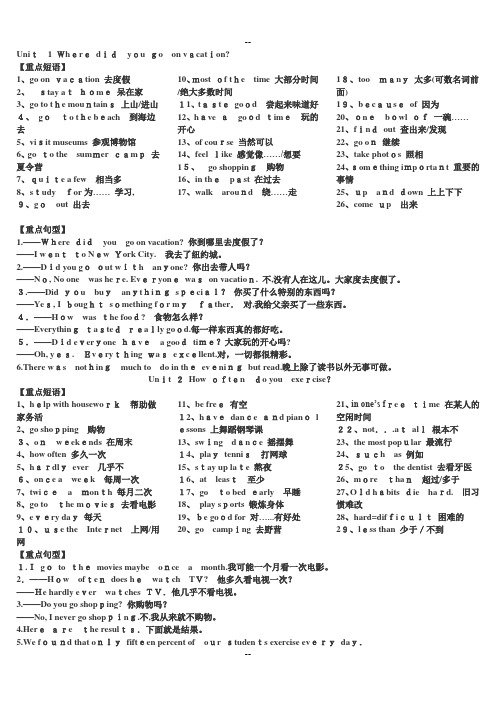
Unit 1 Wheredidyou go on vacation? 【重点短语】1、go on vacation 去度假2、stay athome呆在家3、go to the mountains上山/进山4、goto the beach到海边去5、visit museums 参观博物馆6、go to the summer camp去夏令营7、quite a few相当多8、studyfor为…… 学习,9、goout 出去10、most of the time 大部分时间/绝大多数时间11、tastegood尝起来味道好12、have agood time玩的开心13、of course 当然可以14、feel like 感觉像……/想要15、go shopping购物16、in thepast 在过去17、walk around绕……走18、toomany太多(可数名词前面)19、becauseof 因为20、onebowl of一碗……21、findout 查出来/发现22、go on继续23、take photos 照相24、something important 重要的事情25、up and down 上上下下26、come up出来【重点句型】1.——Where didyou go on vacation? 你到哪里去度假了?——I wentto New York City.我去了纽约城。
2.——Did you goout with anyone? 你出去带人吗?——No, No one was here. Everyonewason vacation. 不,没有人在这儿。
大家度去度假了。
3.——Did you buyanythingspecial?你买了什么特别的东西吗?——Yes, I boughtsomething for myfather.对,我给父亲买了一些东西。
4.——How was the food?食物怎么样?——Everythingtastedreally good.每一样东西真的都好吃。

【最新整理,下载后即可编辑】广州八年级英语(上册)主要知识点Unit 1 Newspaperseful phrases and expressions Take charge of 主管,掌管Vote for …投赞成票Take note 记录Be responsible for 负责,有责任Talk ....over 详谈Make a list of .....把…列成清单Be free for (someone) 对(某人)免费Pay....for 付费Make a decision about.... 对…作出决定In one week's time 一周后A copy of 一份For free 免费From the air 从空中Of one's own 某人自己的Have the habit of.... 有…的习惯Try one's best 尽力Try to (do something) 尽力(做某事)Try doing something 尝试做某事Believe in oneself 相信自己Once a week 每周一次Be pleased with.... 对…满意Keep fit 保持健康Have a high fever 发高烧At break 课间休息Not at all 一点也不,完全不Get on well 相处得好For this reason 因为这样2.语法language: should and ought to (positive)should not and ought not to (negative)3.辨析3.1O ther, the other, another(1) Other 表示泛指,没有特定的范围。
E.g. Lei Feng always helped other people.(2) The other 意为“另一个”,一般用于两者之间。

初二英语知识点归纳一、基本语法知识:1. 时态:一般现在时、一般过去时、一般将来时、现在进行时、过去进行时、将来进行时、现在完成时、过去完成时、将来完成时等。
2. 句型:陈述句、疑问句、否定句、祈使句、感叹句、条件句等。
3. 名词:单数、复数、可数名词、不可数名词、所有格等。
4. 代词:人称代词、物主代词、指示代词、疑问代词、不定代词等。
5. 冠词:定冠词、不定冠词等。
6. 形容词:比较级、最高级、形容词前置修饰语等。
7. 副词:频度副词、程度副词、时间副词、地点副词、方式副词等。
8. 动词:不规则动词、动词的时态、动词的语态等。
9. 介词:常见介词、介词短语等。
10. 连词:并列连词、从属连词、转折连词等。
11. 非谓语动词:不定式、动名词、现在分词、过去分词等。
12. 从句:名词性从句(主语从句、宾语从句、表语从句、同位语从句)、定语从句、状语从句等。
二、词汇知识:1. 动词短语:动词+副词/介词、动词+名词等。
2. 常见短语、习语和固定搭配。
3. 同义词、反义词和近义词。
4. 常用的词根、前缀和后缀。
5. 一些常见的词汇拼写规则和变形规则。
6. 数字、日期、星期、时间、颜色、动物、食物、家庭成员、学科、国家和城市等。
三、阅读理解:1. 根据文章内容回答问题。
2. 根据文章中的信息进行推测、判断或总结。
3. 理解文章的主旨、目的、态度、观点等。
4. 根据文章的语境理解词义。
5. 了解不同类型的文体特征和写作方式。
四、写作能力:1. 书面表达:写信、写日记、写作文等。
2. 口头表达:简单介绍、自我介绍、描述事物等。
3. 语法运用:正确使用时态、人称、冠词、代词等。
4. 语言表达:丰富的词汇、恰当的句型、流畅的语言。
五、听力技能:1. 听懂并获取关键信息。
2. 根据对话或短文回答问题。
3. 听懂人物之间的对话和交流。
4. 培养对英语语音和语调的感觉。
六、口语交流:1. 学会问问题和回答问题。
2. 学会用英语进行简单的交流和沟通。

Unitl Where did you go on vacation?【重点短语】1.go on vacation 去度假2.stay at home 呆在家3.go to the mountains 上山/进山4.go to the beach 到海边去5.visit museums参观博物馆6.go to the summer camp 去夏令营7.quite a few 相当多8.study for 为.. 学习,9.go out 出去10.most of the time大部分时间/绝大多数时间11.taste good尝起来味道好12.have a good time 玩的开心13.of course当然可以14.feel like感觉像 .... /想要15.go shopping 去购物16.in the past 在过去17.wa 1 k around 绕.. 走18.too many太多(可数名词前面)19.because of 因为20.one bowl of 一碗....21.find out查出来/发现22.go on 继续23.take photos 照相24.something important 重要的事情25.up and down 上上下下e up 出来【重点句型】1.--- Where did you go on vacation? 你到哪里去度假了?--- 1 went to New York City. 我去了纽约城。
2.--- Did you go out with anyone? 你出去带人吗?--- No, No one was herc. Everyone was on vacation. 不,没有人在这儿。
大家度去度假了。
3.--- Did you buy anything special? 你买了什么特别的东西吗?--- Yes, I bought something for my father.对,我给父亲买了一些东西。

八年级上册英语知识点归纳总结一、重点短语1. how often 多久2. junk food 垃圾食品3. a lot of = lots of 许多4. hardly 几乎不5. eat up 吃光6. be careful with 当心7. drop litter 丢垃圾8. on the one hand 一方面9. on the other hand 另一方面10. run out of 用完11. come up with 想出12. be full of 装满13. prevent…from 阻止…做…14. end up 结束15. more than = over 超过,多于16. depend on 依靠17. look for 寻找18. so that 以便,为了19. thousands of 数以千计的20. can’t wait to do sth 迫不及待做某事21. around the world 在全世界22. in different ways 以不同的方式23. as we know 正如我们所知24. make a difference 有所作为25. become successful 取得成功26. seem impossible 似乎不可能27. give up easily 轻易放弃二、重点句型1. It’s +形容词+ to do sth. 干某事是……的。
2. It takes sb some time to do sth. 花某人多长时间干某事。
3. How do you keep healthy?你怎么保持健康?4. Here’s an idea!我有个主意!5. I really enjoy the time when I’m with you. 我真的很喜欢和你在一起的时光。
6. is it possible to do sth?干某事可能吗?7. It’s important to do sth. 干某事是重要的。

初二英语全部知识点归纳一、词汇和语法知识点1. 时态:一般现在时、一般过去时、一般将来时、现在进行时、过去进行时、过去完成时等。
2. 介词:表示位置关系(in, on, at);表示时间关系(at, on, in, before, after)等。
3. 冠词:不定冠词(a, an)、定冠词(the)等。
4. 数词:基数词和序数词的用法。
5. 名词:可数名词和不可数名词的区别及用法;名词所有格的构成等。
6. 代词:人称代词、物主代词、指示代词、不定代词等。
7. 形容词:形容词的基本用法及比较级、最高级的构成等。
8. 副词:副词的基本用法及比较级、最高级的构成等。
9. 动词:动词的变化规则、情态动词的用法等。
10. 句型:陈述句、疑问句、祈使句、感叹句、条件句等。
11. 从句:定语从句、宾语从句、表语从句、状语从句等。
二、阅读理解知识点1. 阅读技巧:理解主题、根据上下文猜测词义、抓住关键信息等。
2. 主旨大意:根据文章的首句和尾句,了解文章的中心思想。
3. 推理判断:通过文章中的细节推断,对文中的事实进行判断。
4. 细节理解:理解文章细节,包括信息的明示和暗示、细节的排序和归类等。
5. 逻辑推理:根据文章中的信息,分析作者的观点和态度。
6. 指代理解:理解文章中代词、指示词的指代关系。
7. 文章结构:了解文章各部分之间的逻辑关系,如因果关系、转折关系等。
三、写作知识点1. 作文结构:开头(引入话题、提出主题)、主体(论证观点、给出例子、做出解释)、结尾(总结观点、给出建议)。
2. 写作技巧:使用恰当的连接词、使用合理的句子结构、选择恰当的词汇表达等。
3. 句式变换:改变句子的主动语态、被动语态、复合句的变换等。
4. 书信写作:了解书信的格式和写作要求,包括称呼、结尾、语气等。
5. 日记写作:写作日记时候应注意语言简洁明了,情感真实,时态正确等。
四、听力知识点1. 听懂对话和短文:理解对话中的信息和短文的主旨。

初二(八年级)上册英语第一单元知识点一、短语1、如有always ,often, usually, sometimes, seldom, never, once a....,every...用一般现在时,第一、二人称复数后跟动词原形,第三人称单数后跟动词加's'/'es'。
2、如有now ,look! ,listen, at the moment ....用现在进行时,结构是be (am, is, are) +v-ing3、如有tomorrow, the day after tomorrow, from now on, in +一段时间, some day, next....用一般将来时,结构:will + v原\ be going to +v原(没有动词用be )4、如有yesterday, ......ago , last....just now.....用一般过去时动词加edgive sb. Sth.=give sth. to sb. 给某人某物every day每天,write down 写下,记下write it (them) down everyday每天的,日常的,how about doing sth.=what about doing sth.做....怎么样each other 互相.thanks a lot= thank you very much非常谢谢回答That's all right. =You're welcome.= That'OK.= It's my pleasure.=Not at all.Why don't you+V原...=why not+...V原为什么不help sb. with sth. 在某方面帮助别人help sb. (to )do sth.帮助某人做某事with one's help=with the help of sb.在某人的帮助help oneself to sth.请自用食物watch sb. do sth. 看到某人做了某事,(现在没有做,做过)watch sb. doing sth.看到某人正在做某事(正在做)see, hear类似remember to do sth.想起记得要做某事,未做事remember doing sth.相起记得做过某事forget to do sth. 忘记要做某事forget doing sth.忘记做过某事welcome back欢迎回来, new term新学期this term这学期, next term 下学学期,last term上学期, give you some advice给你一些建议,why not 为什么不, make a mistake=make mistakes犯错误,correct spelling正确的拼写, what else?=what other things? 还有什么a piece of advice 一条建议, follow /take one's advice采用别人的建议,send sth to sb.=send sb. sth. 寄给某人send for派人去请/取send up发射. all the time一直enjoy oneself=have a good time=have a great time=have fun, 玩得愉快lots of =a lot of =many(可数)\much(不可数)许多, ,spend : sb. spend some time on sth.某人花费时间做某事sb. spend some time (in) doing sth. 某人花费时间做某事Sb. spend some money on sth. 某人花费钱买某物Sb. spend some money (in) buying sth.某人花费钱买某物Cost: sth. cost sb. some money 某物花去某人钱pay: sb. pay some money for sth. 某人支付钱Take: It takes (took) sb.some time to do sth.做某事花去某人时间ask for 请求,要求, ask sb. for sth.向某人要某物ask sb. to do sth.要求某人做某事 a piece of一块enjoy doing sth喜欢做某事.finish,practise, mind, miss ,consider,keep, continue,这些词语后跟动名词形式V-ingplace sth.in =put sth. in 把某物放在…里面else常修饰不定代词,关系代词或副词,也可修饰all, much,little等,else要位于其后。
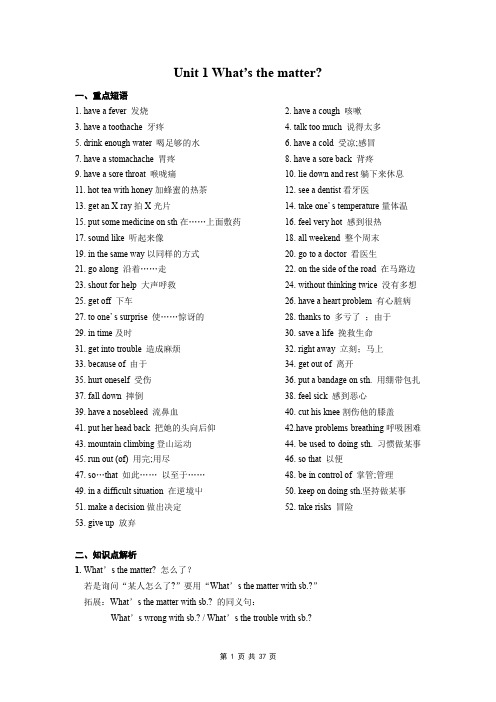
Unit 1 What’s the matter?一、重点短语1. have a fever 发烧2. have a cough 咳嗽3. have a toothache 牙疼4. talk too much 说得太多5. drink enough water 喝足够的水6. have a cold 受凉;感冒7. have a stomachache 胃疼8. have a sore back 背疼9. have a sore throat 喉咙痛10. lie down and rest躺下来休息11. hot tea with honey加蜂蜜的热茶12. see a dentist看牙医13. get an X-ray拍X光片14. take one’ s temperature量体温15. put some medicine on sth在……上面敷药16. feel very hot 感到很热17. sound like 听起来像18. all weekend 整个周末19. in the same way以同样的方式20. go to a doctor 看医生21. go along 沿着……走22. on the side of the road 在马路边23. shout for help 大声呼救24. without thinking twice 没有多想25. get off 下车26. have a heart problem 有心脏病27. to one’ s surprise 使……惊讶的28. thanks to 多亏了;由于29. in time及时30. save a life 挽救生命31. get into trouble 造成麻烦32. right away 立刻;马上33. because of 由于34. get out of 离开35. hurt oneself 受伤36. put a bandage on sth. 用绷带包扎37. fall down 摔倒38. feel sick 感到恶心39. have a nosebleed 流鼻血40. cut his knee割伤他的膝盖41. put her head back 把她的头向后仰42.have problems breathing呼吸困难43. mountain climbing登山运动44. be used to doing sth. 习惯做某事45. run out (of) 用完;用尽46. so that 以便47. so…that 如此……以至于……48. be in control of 掌管;管理49. in a difficult situation 在逆境屮50. keep on doing sth.坚持做某事51. make a decision做出决定52. take risks 冒险53. give up 放弃二、知识点解析1. What’s the matter? 怎么了?若是询问“某人怎么了?”要用“What’s the matter with sb.?”拓展:What’s the matter with sb.? 的同义句:What’s wrong with sb.? / What’s the trouble with sb.?2.疾病类短语:have a +疾病. e.g. :have a fever 发烧have a cold 感冒have a cough 咳嗽.have a +身体部位-ache. e.g.: have a headache 头痛have a toothache 牙痛.have a sore+身体部位. e.g.: have a sore throat咽喉痛have a sore back背痛例题:Mom, I____________.I’m sorry to hear that, dear. We must go to see the dentist right away.A. have a headacheB. have a stomachacheC. have a toothacheD. have a fever3. lie down 躺下V. 躺,平躺。
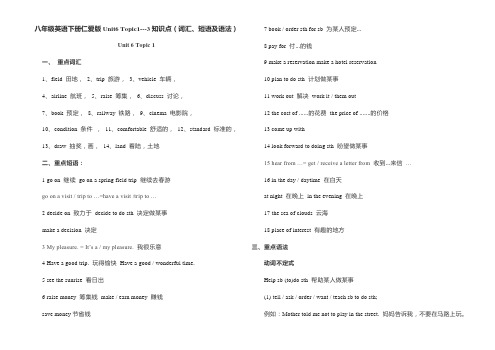
八年级英语下册仁爱版Unit6 Topic1---3知识点(词汇、短语及语法)Unit 6 Topic 1一、重点词汇1、field 田地,2、trip 旅游,3、vehicle 车辆,4、airline 航班,5、raise 筹集,6、discuss 讨论,7、book 预定,8、railway 铁路,9、cinema 电影院,10、condition 条件,11、comfortable 舒适的,12、standard 标准的,13、draw 抽奖,画,14、land 着陆,土地二、重点短语:1 go on 继续go on a spring field trip 继续去春游go on a visit / trip to …=have a visit /trip to …2 decide on 致力于decide to do sth 决定做某事make a decision 决定3 My pleasure. = It’s a / my pleasure. 我很乐意4 Have a good trip. 玩得愉快Have a good / wonderful time.5 see the sunrise 看日出6 raise money 筹集钱make / earn money 赚钱save money节省钱7 book / order sth for sb 为某人预定...8 pay for 付...的钱9 make a reservation make a hotel reservation10 plan to do sth 计划做某事11 work out 解决work it / them out12 the cost of ......的花费the price of .......的价格13 come up with14 look forward to doing sth 盼望做某事15 hear from …= get / receive a letter from 收到...来信…16 in the day / daytime 在白天at night 在晚上in the evening 在晚上17 the sea of clouds 云海18 place of interest 有趣的地方三、重点语法动词不定式Help sb (to)do sth 帮助某人做某事(1) tell / ask / order / want / teach sb to do sth;例如:Mother told me not to play in the street. 妈妈告诉我,不要在马路上玩。

八年级全册知识点英语Eight Grade Full Curriculum Knowledge Points in EnglishAs students progress through their eighth-grade English class, they will encounter a plethora of knowledge points that are essential to their growth in the language. These knowledge points span across various aspects of the English language, including grammar, vocabulary, reading comprehension, and writing.Grammar Knowledge Points:Grammar is a fundamental aspect of the English language. Some of the essential grammar knowledge points that students will encounter in their eighth-grade English class include:1. Proper use of tensesStudents must understand the various English tenses and be able to use them correctly in writing and speech. They should also be able to differentiate between different tenses and when to use them appropriately.2. Parts of speechStudents will learn the various parts of speech, including nouns, verbs, adjectives, pronouns, adverbs, and conjunctions. They will also learn how to use these parts of speech in sentences correctly.3. PunctuationCorrect use of punctuation is critical in the English language. Students should be able to use punctuation marks such as commas, periods, question marks, and exclamation marks appropriately to enhance their sentences' clarity.Vocabulary Knowledge Points:A good vocabulary is key to effective communication in the English language. Some of the essential vocabulary knowledge points that students will encounter in their eighth-grade English class include:1. Synonyms and antonymsStudents will learn different words' synonyms and antonyms to improve their writing and speech. This knowledge will enable them to express themselves correctly and accurately.2. Root words and affixesStudents will study the various root words and affixes to understand how words are constructed. This knowledge will help them to decipher the meaning of unfamiliar words.3. Idioms and figurative languageStudents will learn idiomatic expressions and figurative language, such as similes, metaphors, and hyperbole, to enrich their writing and speech.Reading Comprehension Knowledge Points:Reading is a fundamental skill in language acquisition. Some of the essential reading comprehension knowledge points that students will encounter in their eighth-grade English class include:1. Understanding main ideas and detailsStudents will learn how to identify the main ideas and details in a text to understand the author's message better.2. Analyzing texts for meaningStudents will learn how to analyze texts to understand their meaning, themes, and context fully.3. InferringStudents will learn how to draw conclusions by inferring information from a text.Writing Knowledge Points:Effective writing skills are critical to success in the English language. Some of the essential writing knowledge points that students will encounter in their eighth-grade English class include:1. Writing a clear thesis statementStudents will learn how to write a clear and concise thesis statement that captures the essence of their argument.2. Developing paragraphs with supporting evidenceStudents will learn how to develop paragraphs with supporting evidence to substantiate their arguments.3. Editing and revisingStudents will learn how to edit and revise their writing to improve clarity, coherence, and grammar.In conclusion, eighth-grade English is a rich and diverse subject that covers a wide range of knowledge points. Students must master these knowledge points to develop their English language skills fully, enabling them to communicate with fluency, accuracy, and confidence.。

八年级全册英语归纳总结知识点During the eighth grade, students learn a wide range of English language skills and knowledge. This article aims to provide a comprehensive summary of the key points covered in the eighth-grade English curriculum.1. Grammar1. Verb Tenses:- Present Simple: used for facts, habits, and general truths.- Present Continuous: used for actions happening at the moment of speaking.- Past Simple: used for completed actions in the past.- Past Continuous: used for actions in progress at a specific time in the past.- Future Simple: used for future plans and predictions.2. Parts of Speech:- Nouns: refer to people, places, things, or ideas.- Pronouns: replace nouns in sentences.- Verbs: express actions or states of being.- Adjectives: describe or modify nouns.- Adverbs: modify verbs, adjectives, or other adverbs.- Prepositions: indicate relationships between words.- Conjunctions: connect words or groups of words.- Interjections: express strong emotions.3. Sentence Structure:- Subject-Verb Agreement: ensuring the subject and verb agree in number.- Sentence Types: declarative, interrogative, imperative, and exclamatory.- Direct and Indirect Speech: reporting speech using proper punctuation and tense changes.- Conditional Sentences: expressing hypothetical situations.4. Active and Passive Voice: understanding the difference and transforming sentences between the two forms.5. Reported Speech: reporting what someone else said in writing or speaking.2. Vocabulary1. Word Formation: understanding prefixes, suffixes, and roots to determine the meanings of unfamiliar words.2. Synonyms and Antonyms: learning words with similar or opposite meanings.3. Idioms and Phrasal Verbs: familiarizing oneself with common expressions and their meanings.4. Collocations: understanding combinations of words that frequently occur together.5. Contextual Vocabulary: deducing word meanings from the surrounding text.3. Reading Comprehension1. Skimming: quickly reading to get a general understanding of the text.2. Scanning: rapidly locating specific information in a text.3. Inference: drawing conclusions based on the information provided.4. Main Idea and Supporting Details: identifying the central theme and related information in a text.5. Text Structure: recognizing the organization of a text (i.e., chronological, cause-effect, problem-solution).4. Writing Skills1. Paragraph Writing: structuring clear and coherent paragraphs.2. Narrative Writing: telling a story with proper sequence and descriptive details.3. Descriptive Writing: using vivid language to describe people, places, or objects.4. Persuasive Writing: expressing opinions, supporting arguments, and convincing others.5. Letter Writing: understanding the format and tone for writing formal and informal letters.5. Speaking and Listening1. Oral Presentations: delivering informative speeches to the class.2. Group Discussions: exchanging ideas and opinions in a collaborative setting.3. Active Listening: using attentive and responsive listening techniques.4. Pronunciation: practicing correct pronunciation of words and phrases.5. Presentation Skills: using appropriate body language, eye contact, and vocal expression.6. Culture and Literature1. Exploring literary genres: novels, short stories, poetry, and plays.2. Studying authors: understanding the lives and works of famous authors.3. Cultural Practices: gaining insights into different cultures and traditions through literature.In conclusion, the eighth-grade English curriculum encompasses a wide range of grammar, vocabulary, reading, writing, speaking, and listening skills. Mastering these knowledge points will help students develop strong English language abilities and effectively communicate in both written and spoken forms.。
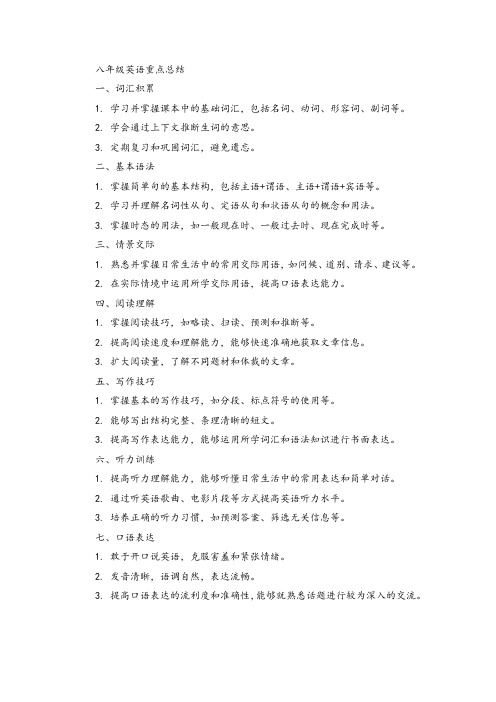
八年级英语重点总结一、词汇积累1. 学习并掌握课本中的基础词汇,包括名词、动词、形容词、副词等。
2. 学会通过上下文推断生词的意思。
3. 定期复习和巩固词汇,避免遗忘。
二、基本语法1. 掌握简单句的基本结构,包括主语+谓语、主语+谓语+宾语等。
2. 学习并理解名词性从句、定语从句和状语从句的概念和用法。
3. 掌握时态的用法,如一般现在时、一般过去时、现在完成时等。
三、情景交际1. 熟悉并掌握日常生活中的常用交际用语,如问候、道别、请求、建议等。
2. 在实际情境中运用所学交际用语,提高口语表达能力。
四、阅读理解1. 掌握阅读技巧,如略读、扫读、预测和推断等。
2. 提高阅读速度和理解能力,能够快速准确地获取文章信息。
3. 扩大阅读量,了解不同题材和体裁的文章。
五、写作技巧1. 掌握基本的写作技巧,如分段、标点符号的使用等。
2. 能够写出结构完整、条理清晰的短文。
3. 提高写作表达能力,能够运用所学词汇和语法知识进行书面表达。
六、听力训练1. 提高听力理解能力,能够听懂日常生活中的常用表达和简单对话。
2. 通过听英语歌曲、电影片段等方式提高英语听力水平。
3. 培养正确的听力习惯,如预测答案、筛选无关信息等。
七、口语表达1. 敢于开口说英语,克服害羞和紧张情绪。
2. 发音清晰,语调自然,表达流畅。
3. 提高口语表达的流利度和准确性,能够就熟悉话题进行较为深入的交流。
八、文化背景1. 了解英语国家的文化背景和习俗,如节日、传统、食物等。
2. 培养跨文化交流的意识,尊重并接纳不同文化。
3. 增强对英语国家历史和地理的了解,提高跨文化交流的能力。
九、学习策略1. 制定合理的学习计划,保证每天有一定的学习时间。
2. 培养良好的学习习惯,如定时复习、整理笔记等。
3. 积极参与课堂活动,与老师和同学进行互动和交流。
4. 善于利用各种学习资源,如英语词典、学习网站等。
5. 坚持进行英语实践,如英语角、口语练习等,提高英语实际应用能力。

八年级上册英语总复习(知识点汇总)
一、基本语法知识点
- 词汇:掌握八年级上册涉及的词汇,如名词、动词、形容词、副词等。
- 时态:熟悉一般现在时、一般过去时和一般将来时的构成和
用法。
- 句子结构:了解简单句、并列句和复合句的组成和使用方法。
- 语态:理解被动语态的构成和用法。
二、听力技巧
- 注意听力材料中的关键词,并对比选项进行判断。
- 注意听力材料中的语音语调,辨别重要信息。
- 注意时间、地点和人物等信息的提取。
三、阅读技巧
- 预览文章段落,了解大意及文章结构。
- 注意文章中的关键词,理解整个文章的主旨。
- 根据文章内容填写相关信息、选择正确答案或完成文章概述。
四、写作技巧
- 了解不同类型的写作任务,如叙述、说明、议论等。
- 练使用适当的词汇和句型表达自己的观点和想法。
- 注意书写格式、语法和拼写,提高写作质量。
五、语言知识
- 重点掌握八年级上册课本中的课文及相关练的语法、词汇和
常用句型。
- 针对容易出错的语言知识进行专项练,加深理解和记忆。
六、口语练
- 进行口语练,提高口语表达能力。
- 多参与英语口语交流,积累口语表达经验。
七、其他技巧
- 多听英语广播、看英文电影或电视剧,提高英语听力水平。
- 多做英语练题,培养解题技巧和思维能力。
以上为八年级上册英语总复习的知识点汇总,希望对你的学习有所帮助!。
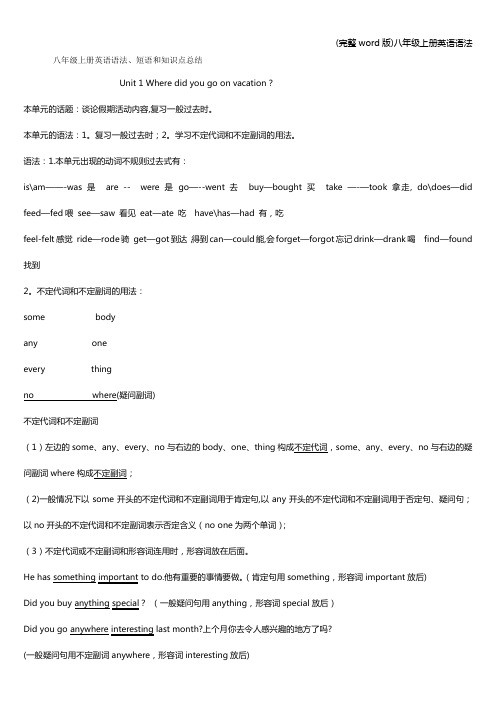
八年级上册英语语法、短语和知识点总结Unit 1 Where did you go on vacation?本单元的话题:谈论假期活动内容,复习一般过去时。
本单元的语法:1。
复习一般过去时;2。
学习不定代词和不定副词的用法。
语法:1.本单元出现的动词不规则过去式有:is\am——-was是are -- were是go—--went去buy—bought买take —-—took拿走, do\does—did feed—fed喂see—saw 看见eat—ate 吃have\has—had 有,吃feel-felt感觉ride—rode骑get—got到达,得到can—could能,会forget—forgot忘记drink—drank喝find—found 找到2。
不定代词和不定副词的用法:some bodyany oneevery thingno where(疑问副词)不定代词和不定副词(1)左边的some、any、every、no与右边的body、one、thing构成不定代词,some、any、every、no与右边的疑问副词where构成不定副词;(2)一般情况下以some开头的不定代词和不定副词用于肯定句,以any开头的不定代词和不定副词用于否定句、疑问句;以no开头的不定代词和不定副词表示否定含义(no one为两个单词);(3)不定代词或不定副词和形容词连用时,形容词放在后面。
He has something important to do.他有重要的事情要做。
(肯定句用something,形容词important放后)Did you buy anything special?(一般疑问句用anything,形容词special放后)Did you go anywhere interesting last month?上个月你去令人感兴趣的地方了吗?(一般疑问句用不定副词anywhere,形容词interesting放后)(4)不定代词和不定副词做主语时,后面的动词用单数形式。
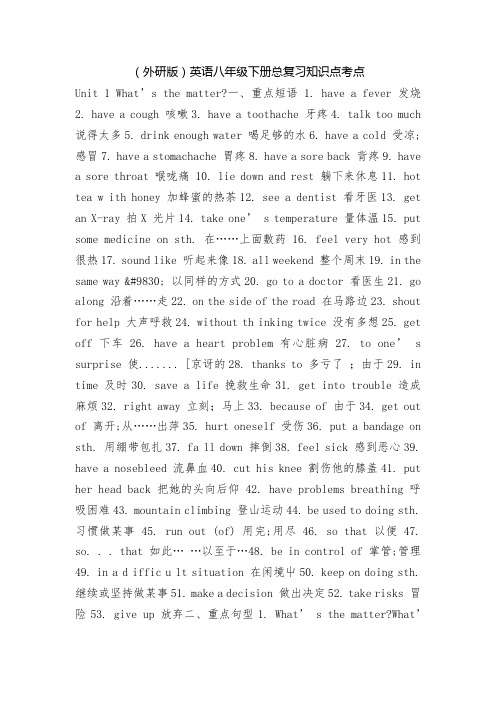
(外研版)英语八年级下册总复习知识点考点Unit 1 What’s the matter?一、重点短语 1. have a fever 发烧2. have a cough 咳嗽3. have a toothache 牙疼4. talk too much 说得太多5. drink enough water 喝足够的水6. have a cold 受凉;感冒7. have a stomachache 胃疼8. have a sore back 背疼9. have a sore throat 喉咙痛 10. lie down and rest 躺下来休息11. hot tea w ith honey 加蜂蜜的热茶12. see a dentist 看牙医13. get an X-ray 拍X 光片14. take one’ s temperature 量体温15. put some medicine on sth. 在……上面敷药16. feel very hot 感到很热17. sound like 听起来像18. all weekend 整个周末19. in the same way ♦ 以同样的方式20. go to a doctor 看医生21. go along 沿着……走22. on the side of the road 在马路边23. shout for help 大声呼救24. without th inking twice 没有多想25. get off 下车26. have a heart problem 有心脏病27. to one’ s surprise 使....... [京讶的28. thanks to 多亏了;由于29. in time 及时30. save a life 挽救生命31. get into trouble 造成麻烦32. right away 立刻;马上33. because of 由于34. get out of 离开;从……出萍35. hurt oneself 受伤36. put a bandage on sth. 用绷带包扎37. fa ll down 摔倒38. feel sick 感到恶心39. have a nosebleed 流鼻血40. cut his knee 割伤他的膝盖41. put her head back 把她的头向后仰42. have problems breathing 呼吸困难43. mountain climbing 登山运动44. be used to doing sth. 习惯做某事 45. run out (of) 用完;用尽46. so that 以便47. so. . . that 如此……以至于…48. be in control of 掌管;管理49. in a d iffic u lt situation 在闲境屮50. keep on doing sth. 继续或坚持做某事51. make a decision 做出决定52. take risks 冒险53. give up 放弃二、重点句型1. What’ s the matter?What’s the matter with you?= What’s the trouble with you?= What’s wrong with you?你怎么了?2. W hat should she do?她该怎么办呢?Should I take my temperature?我应该量一下体温吗?主语+ should/shouldn’t + 动词原形. ..①You should lie down and rest.你应该躺下休息一会儿。

八年级上学期英语知识点八年级英语短语总汇Unit1 Topic11.be going to do 打算做某事2.See sb do sth看见某人做某事(全过程)See sb doing sth看见某人正在做某事(正在进行)3.cheer sb on为...加油4.Play against=fight against 与...对抗/大战5.Be against--Be for 反对—赞同6.practice+doing 练习做...7.Prefer+doing 跟喜欢...Prefer doing to doing 或比起做后者,更喜欢做前者Perfer to do, quite a lot/bit/often.Which one do you prefer, which kind of that?10. Join+某人/组织Join in+活动/比赛加入Take part in+活动/比赛Be in+活动/比赛13.Know about... 知道/了解有关于...当时间来临时,我们将采取行动;这是我们的计划。
15. It takes sb+时间/钱 to do sthSpend+时间/钱+(in) doing sth 在某方面花费多少Spend+时间/钱+on+n.物+cost+时间/钱16.There be going to be=there will be 这里将会有...17.Be good at+(doing)sth=Do well in+(doing)sth 擅长做...18.Be sure that+宾语从句确信... 19.Be sure to do 肯定要做...20.Be sure of/about 对...有把握 21.At the weekend 在周末22.Make sb/sth+adj 使...处在什么状态23.Keep+adj 保持...;keep sb/sth+adj 使...保持什么状态24.A way to 一种...的方法 25.Relax oneself 使某人自己放松26.Play for 为...效力27.Arrive in=get to=reach+大地方;Arrive at+小地方28.Excited(人);exciting(物)29.Leave for动身做某地;leave A for B 离开A地去B地Unit1 Topic21.Could you(not)....=cuold/would you please(not)do=would/do youmind(not)doing=Would you mind (not)+if+从句2.fall ill=be ill 生病其中之一是n的复数形式.优化后的文本可以是:Use 'keep doing' for continuous action and 'keep on doing' for repeated action with intervals.5.Help sb.=give sb a hand 帮助某人6.V.+间宾(人)+直宾(物)=V.+直宾+to/for+间宾7.Sure=certainly=of course 当然8.Not at all=certainly not=of course not 不介意9.Never mind=it’s nothing=it’s doesn’t matter 没关系乱扔11.Adj.修饰不定代词放其后12.Be sorry for/about.... 对...感到内疚13.What do you mean by...?=what does...mean?=what’s the meaning of...?意思是什么?14.Shout at sb. 斥责某人15.Do/try one’s best to do sth 尽某人做大的努力做某事16.Be angry with sb. For doing sth 因为某人做某事而生气17.be angry at/about sth 因某事而生气18.be angry with 因...而生气19.With the help of sb.=with one’help 在某人的帮助下20.Say...to sb. 对某人说...e into being=be born 形成/产生22.So...that... 如此...以致...=to...too... 太...而不能...23.A century=one hundred year 一个世纪24.Over=more than 超过25.Through(中间)=aross(表面) 通过阻止他们从做28.It’s + adj +(for sb.)+to do (对某人来说)做...是...29.Another+基数词又一,在一; other +n.复数另外的Around=all_over 处到处31.Just for...只是为了...32.Turn...into... 使...变成...33.Sit around 围坐在34.Get from doing 得到...35.Such as 后不可列出前面所提过的所有东西36.A number of+n.可数复数许多的;the number of+n.单数 ...的数量37.Hero 复数(Pl.) heroesUnit1 Topic31.连字符后不加soman则例外,需用复数。

初二英语必考知识点一、词汇与拼写1. 动词时态与语态:包括一般现在时、一般过去时、一般将来时、现在进行时、过去进行时、过去将来时、被动语态等。
2. 名词、代词与形容词的用法:包括单复数形式、所有格、人称代词、物主代词、指示代词、反身代词、形容词的比较级与最高级等。
3. 副词、介词与连词的用法:包括频度副词、程度副词、时间介词、地点介词、方向介词、关系词、并列连词、从属连词等。
4. 冠词与数词的用法:包括定冠词、不定冠词、零冠词、基数词、序数词等。
5. 短语与习惯用语的运用:包括日常用语、商务用语、问候用语、道歉用语、感谢用语、邀请用语等。
二、语法1. 句子结构与句型:包括简单句、并列句、复合句等。
2. 句子成分与从句:包括主语、谓语、宾语、表语、定语、状语、名词性从句、定语从句、状语从句等。
3. 特殊句型与特殊句式:包括祈使句、感叹句、倒装句、条件句、虚拟语气等。
4. 并列关系与递进关系:包括连接副词、连接代词、连接词以及表示并列与递进的表达方式等。
5. 一般疑问句与特殊疑问句的构成与回答方式。
三、阅读理解1. 识记细节与推理判断:通过阅读短文,了解文章中的细节信息,并进行推理判断。
2. 阅读目的与作者意图:通过阅读短文,了解作者写作的目的和意图,把握文章的中心思想。
3. 上下文推测与词语猜测:通过上下文的线索,推测词语或短语的含义。
4. 推理引申与归纳概括:通过阅读短文,进行推理引申,归纳总结文章的主题或观点。
四、写作表达1. 书信写作:包括感谢信、道歉信、邀请信、建议信等。
2. 日记或记叙文写作:包括日常生活的经历、故事情节的叙述等。
3. 图表描述与图文配对:根据提供的图表或图片,进行描述,进行图文配对等。
4. 句子构建与语言运用:句子的连贯性与丰富性、用词准确性、语言的得体性等。
五、听力技巧1. 听取关键信息:通过听力材料,抓取关键信息以快速理解听力内容。
2. 推理推测:通过听力材料中的线索,进行推理推测,补全听力信息。
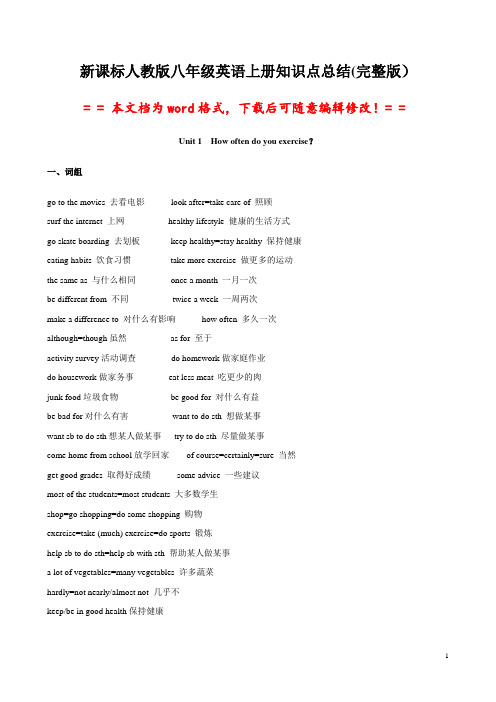
新课标人教版八年级英语上册知识点总结(完整版)==本文档为word格式,下载后可随意编辑修改!==Unit 1 How often do you exercise?一、词组go to the movies 去看电影look after=take care of 照顾surf the internet 上网healthy lifestyle 健康的生活方式go skate boarding 去划板keep healthy=stay healthy 保持健康eating habits 饮食习惯take more exercise 做更多的运动the same as 与什么相同once a month 一月一次be different from 不同twice a week 一周两次make a difference to 对什么有影响how often 多久一次although=though虽然as for 至于activity survey活动调查do homework做家庭作业do housework做家务事eat less meat 吃更少的肉junk food垃圾食物be good for 对什么有益be bad for对什么有害want to do sth 想做某事want sb to do sth想某人做某事try to do sth 尽量做某事come home from school放学回家of course=certainly=sure 当然get good grades 取得好成绩some advice 一些建议most of the students=most students 大多数学生shop=go shopping=do some shopping 购物exercise=take (much) exercise=do sports 锻炼help sb to do sth=help sb with sth 帮助某人做某事a lot of vegetables=many vegetables 许多蔬菜hardly=not nearly/almost not 几乎不keep/be in good health保持健康二、词汇精讲1、always、usually、often、sometimes、hardly ever和neveralways、usually、often、sometimes、hardly ever和never是英语中最常见的频度副词。
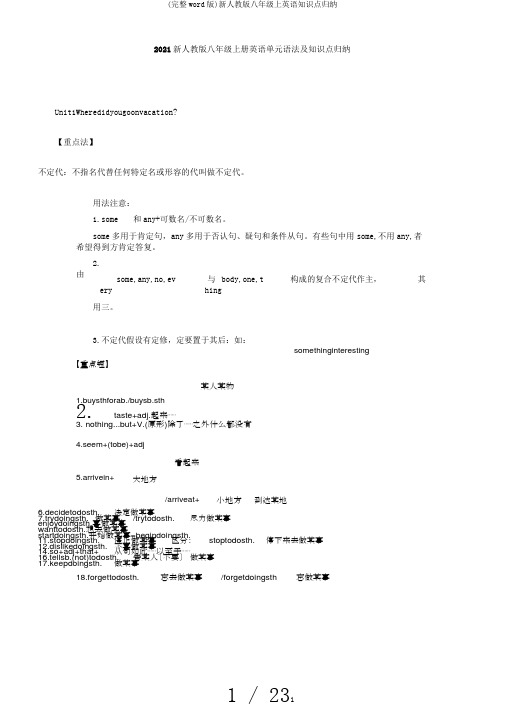
2021新人教版八年级上册英语单元语法及知识点归纳Unit1Wheredidyougoonvacation?【重点法】不定代:不指名代替任何特定名或形容的代叫做不定代。
用法注意:1.some 和any+可数名/不可数名。
some多用于肯定句,any多用于否认句、疑句和条件从句。
有些句中用some,不用any,者希望得到方肯定答复。
2.由some,any,no,ev ery与body,one,thing构成的复合不定代作主,其用三。
3.不定代假设有定修,定要置于其后:如:somethinginteresting 【重点短】1.buysthforab./buysb.sth 某人某物2.taste+adj.起来⋯⋯3.nothing...but+V.(原形)除了⋯⋯之外什么都没有4.seem+(tobe)+adj看起来5.arrivein+大地方/arriveat+小地方到达某地6.decidetodosth.决定做某事7.trydoingsth.做某事/trytodosth.尽力做某事enjoydoingsth.喜做某事wanttodosth.想去做某事startdoingsth.开始做某事=begindoingsth.11.stopdoingsth.停止做某事区分:stoptodosth.停下来去做某事12.dislikedoingsth.不喜做某事14.so+adj+that+从句如此⋯⋯以至于⋯⋯16.tellsb.(not)todosth.告某人〔不要〕做某事17.keepdoingsth.做某事18.forgettodosth.忘去做某事/forgetdoingsth忘做某事【辨析】1.takeaphoto/takephotos拍照quiteafew+名复数“多⋯〞2.seem+形容看起来⋯...Youseemhappytoday.seem+todosth.似乎/好似做某事IseemtohaveacoldItseems+从句似乎..⋯.Itseemsthatnoonebelieveyou.seemlike...好似,似乎⋯..Itseemslikeagoodidea.3.arrivein+大地点=getto=reach+地点名“到达......〞arriveat+小地点〔注:假设后跟地点副here/there/home,介需省略,如:arrivehere;gethome〕4.feellikesth感像⋯feeldoingsth.想要做某事wonder〔想知道〕+疑〔who,what,why)引的从句。